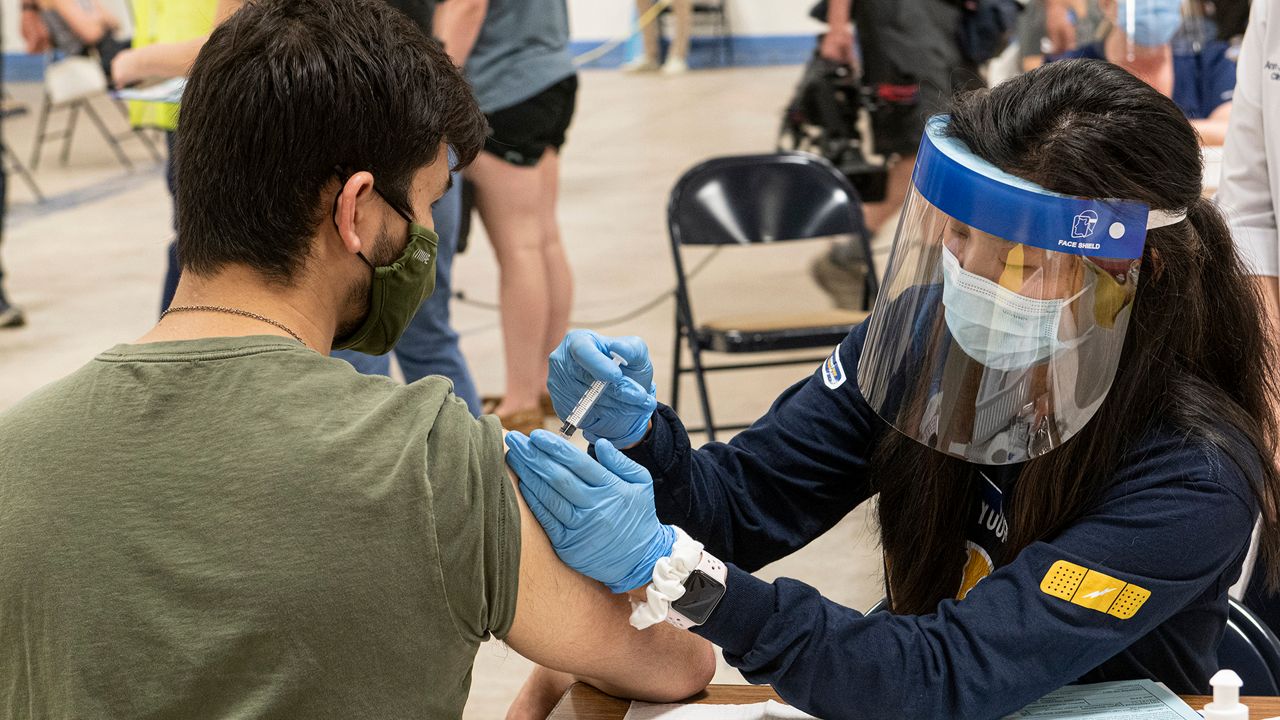COLUMBUS, Ohio — Lawyers representing Ohio colleges argued for the dismissal of lawsuits they face challenging required vaccination, arguing the cases are moot because they recently made vaccination optional.
What You Need To Know
- Several Ohio colleges have stopped requiring vaccination
- An attorney claims his firm's litigation impacted decisions
- Universities deny being influenced by anti-mandate lawsuits
The University of Cincinnati, Ohio University and Bowling Green State University eased their COVID-19 requirements in March and April.
While the universities are arguing the cases should be dismissed because they ended vaccination requirements, they don’t acknowledge the litigation swayed their policy changes.
Mendenhall Law Group represented plaintiffs in separate lawsuits against vaccination policies at the three colleges, and in another against Miami University which still requires vaccination, but not the booster.
Carly Leatherwood, a spokesperson for Ohio University, said they didn’t make their changes in response to the lawsuit. As of the start of this summer semester, students living on-campus must sign a waiver if they are unvaccinated.
“Like other Ohio public institutions, we will require on-campus residential students to vaccinate or sign a waiver, consistent with our practices for the meningitis and hepatitis B vaccinations,” she said.
The University of Cincinnati also announced in late April it was lifting its vaccine requirement beginning with the summer term. Some of the public universities, including UC, are represented in these vaccine lawsuit cases through the Ohio Attorney General’s office.
“It is important to note that the university will continue to consult with medical and public health experts and may change our responses as needed,” officials said.
Attorney Warner Mendenhall said his firm is in a back and forth with the University of Cincinnati as his side argues the case in the Hamilton County Court of Common Pleas should not be dismissed.
“If they would back out and say they don't have the power to mandate, that would make it moot, but they're claiming that they still have the ability to reinstate mandates in the future, so that's why we believe we need to get a ruling on this,” he said.
Mendenhall said his cases against BGSU and OU are in a similar status, with pending motions to dismiss as the universities argue the cases are now moot. Mendenhall stops short of claiming credit for the universities easing their policies, but he thinks the litigation played a role.
“There's a difference between having a legal opinion where you outright win and a situation where your litigation has helped to shape and change the environment, and so I certainly think that there is a level of success that we've experienced because these universities have taken a more reasonable stance,” he said.
In its most recent filing, UC’s attorneys said they granted exemptions for three plaintiffs and the other got the vaccine.
“Plaintiffs have suffered no past harm, given the ready exemptions. And they face no possibility of future harm, particularly considering the end of the University’s vaccination requirement—from which Plaintiffs were already exempt or with which they had complied,” they wrote.
Miami University exempted the three plaintiffs in the case against the university and got a dismissal from the judge in December. Mendenhall said they have appealed that case.
Student protests and lower COVID-19 numbers may have also motivated the universities to drop mandates, Mendenhall said.
While these Ohio universities are dropping COVID-19 vaccine mandates, others are continuing vaccine requirements for the upcoming fall terms, and some are even requiring boosters.
Case Western Reserve University and Oberlin College are among those requiring the booster dose.
“I actually think that's tragic,” Mendenhall said of booster requirements. “The kids really, really are not at risk from COVID. I mean, there's no evidence that they're at risk. In fact, you know, obviously we think that the shots themselves can have health impacts.”
While most young people fare well with COVID-19, some college students in Ohio have been hospitalized with the virus, and data from the state and federal government continues to show that vaccine injury is rare.
Ohio State University continues to require vaccination, but the university is not requiring the booster shot.
Kent State University’s latest update said vaccinations are now strongly recommended, but no longer required, as of their first summer session.
Schools like the University of Dayton haven’t required the vaccination, but they also strongly encourage getting the shot.
At Cleveland State University, admins are still weighing the decision for the upcoming school year.
“The university has not yet made a decision on vaccination requirements for students living on campus for the fall, but will do so in the coming weeks,” spokesperson Alison Bibb-Carson said.
Bowling Green got a favorable ruling on Feb. 28 when the judge granted a motion to dismiss, but Mendenhall said his firm continues to contest the case. Both parties continued to argue their case in court filings this month in the Wood County Common Pleas Court. The complaint contested vaccination, masking and testing protocols.
“Plaintiffs were subject to the same masking requirement as the entire BGSU community and those requirements no longer exist,” the university’s attorneys’ wrote.



